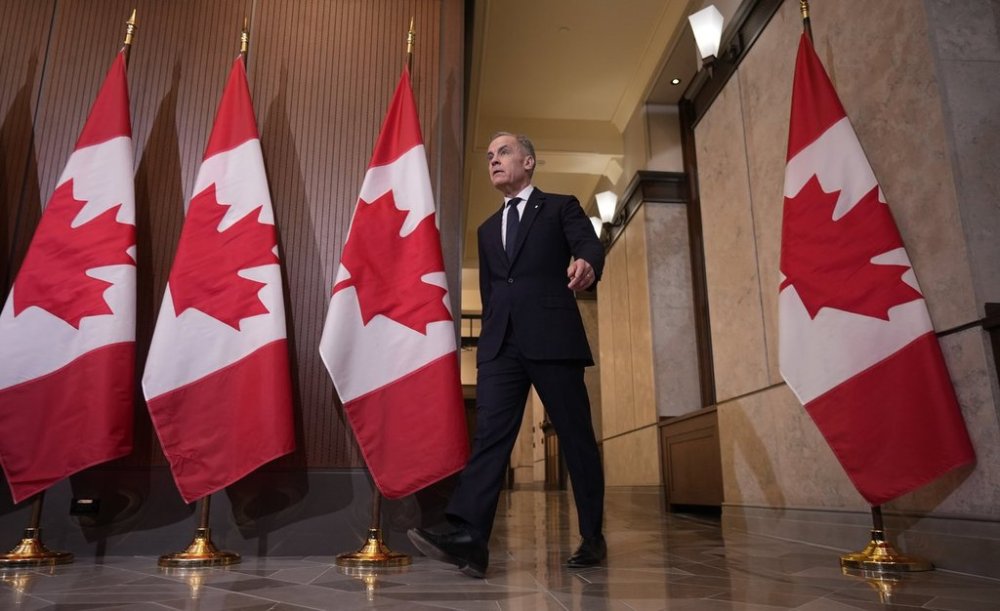Security officials report a Beijing-linked online operation focused on Carney
Advertisement
Read this article for free:
or
Already have an account? Log in here »
To continue reading, please subscribe:
Monthly Digital Subscription
$0 for the first 4 weeks*
- Enjoy unlimited reading on winnipegfreepress.com
- Read the E-Edition, our digital replica newspaper
- Access News Break, our award-winning app
- Play interactive puzzles
*No charge for 4 weeks then price increases to the regular rate of $19.00 plus GST every four weeks. Offer available to new and qualified returning subscribers only. Cancel any time.
Monthly Digital Subscription
$4.75/week*
- Enjoy unlimited reading on winnipegfreepress.com
- Read the E-Edition, our digital replica newspaper
- Access News Break, our award-winning app
- Play interactive puzzles
*Billed as $19 plus GST every four weeks. Cancel any time.
To continue reading, please subscribe:
Add Free Press access to your Brandon Sun subscription for only an additional
$1 for the first 4 weeks*
*Your next subscription payment will increase by $1.00 and you will be charged $16.99 plus GST for four weeks. After four weeks, your payment will increase to $23.99 plus GST every four weeks.
Read unlimited articles for free today:
or
Already have an account? Log in here »
Hey there, time traveller!
This article was published 07/04/2025 (248 days ago), so information in it may no longer be current.
OTTAWA – Federal security officials say they have found an online information operation linked to the Chinese government that focused on Liberal Leader Mark Carney.
The Security and Intelligence Threats to Elections Task Force says it traced the operation to Youli-Youmian, the most popular news account on the social media platform WeChat.
Intelligence reports link the Youli-Youmian account to the Chinese Communist Party’s central political and legal affairs commission.

A background document released Monday by the Privy Council Office said narratives were spread on WeChat “amplifying” Carney’s stance on the United States and targeting his experience and credentials.
Analysts saw “positive and negative narratives” about Carney in the operation, said Larisa Galadza, a director general at Global Affairs Canada, which houses a unit that monitors the online environment.
The security task force includes representatives of Global Affairs, the Canadian Security Intelligence Service, the RCMP and the Communications Security Establishment, Canada’s cyberspy agency.
The task force concluded the information operation aimed at Carney was intended to influence Chinese communities in Canada and sought to shape perceptions about him.
The Youli-Youmian account was also responsible for targeting Conservative politician Michael Chong two years ago and Liberal Chrystia Freeland earlier this year, the backgrounder said.
The task force reported large increases in what federal officials call “co-ordinated, inauthentic” online behaviour concerning Carney on March 10 — before the federal election was called — and again during the writ period on March 25.
“When we talk about co-ordinated and inauthentic behaviour, we see things, for instance, like the same headline appearing across multiple media sources, foreign media sources, usually … and being posted within minutes, if not seconds, of each other,” Galadza said Monday at a media briefing.
“That’s not a typical, organic kind of spread of information.”
Officials provided screenshots of two examples of Chinese-language stories about Carney shared on WeChat.
A Canadian Press translation indicates the first story, headlined “U.S. is facing a ‘tough’ prime minister from Canada,” is a fairly straightforward account of Carney’s recent ascent to the Liberal leadership amid persistent threats to Canada from U.S. President Donald Trump.
It says that although Carney doesn’t have much political experience, it’s very clear that he “has an ambitious economic recovery plan.”
The second story, headlined “Canada’s road to survival in the election,” recounts some of Carney’s early moves as prime minister.
“As a veteran who has been working in the financial industry for many years, Carney is well-versed in the routine of ‘speaking with data.’ Carney quickly launched a tax reduction policy as soon as he rose to power.”
The article then says his political career “has not been smooth sailing so far.”
“At a French-speaking press conference, he made many language mistakes and was mocked by reporters. One commentator said: ‘His French level is probably as good as Trump’s grammatical errors when he posts online!'”
Chong, who is seeking re-election for the Conservatives in an Ontario riding, cited positive information about Carney in the narratives as evidence “the Communist Party in Beijing is engaging in a sophisticated campaign to interfere in Canada’s election” with the aim of electing the Liberals.
Under a federal protocol introduced in 2019, a panel of senior bureaucrats has the power to warn the public if it decides one or more incidents threaten Canada’s ability to hold a free and fair vote.
The panel includes the clerk of the Privy Council, the national security and intelligence adviser, the deputy attorney general and the deputy ministers of public safety and foreign affairs.
Known as the “panel of five,” it receives regular updates from the security task force.
Laurie-Anne Kempton, assistant secretary to the cabinet for communications and consultations, told the briefing Monday that the panel concluded the WeChat activity about Carney was not affecting Canada’s ability to hold a free and fair vote.
“This case is contained to one platform and has not spread further, nor is it affecting Canadians’ abilities to make informed decisions about their vote,” Kempton said.
“It’s unclear to us how many Canadians might have seen the narrative, so it was important for us to flag it, but it’s difficult to gauge beyond that.”
A Liberal party representative was briefed on the findings on April 6, Kempton added.
In addition, the task force planned to raise its concerns with Tencent, the developer of WeChat.
The federal government says it is important for voters to be cautious with the information they might be seeing both online and off-line during the election campaign.
Canadians should always evaluate the information landscape critically, take the time to review sources and messaging, officials said Monday.
— With files from Nono Shen in Vancouver
This report by The Canadian Press was first published April 7, 2025.


















